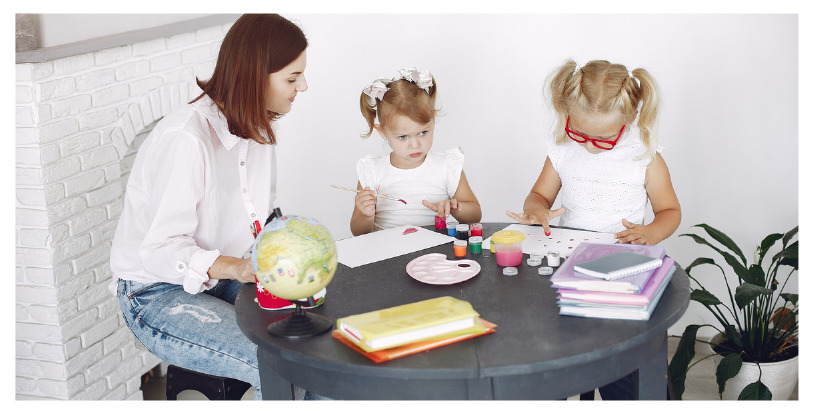Childcare
Summary
Content
Of the refugees from Ukraine, 84 percent are women, 58 percent of them came to Germany together with their children, and 92 percent were employed or in education in Ukraine. These figures show that Childcare is a key aspect of finding work for the Ukrainians you support.

Kitas
Access to day care facilities for children (Kitas) is regulated uniformly throughout Germany. According to the UN Convention on the Rights of the Child, refugee children older than one year also have a legal entitlement to a place in a daycare center. This is regulated in §24 of Social Code VIII.
Unfortunately, however, the right to care is not a guarantee. Due to a lack of staff, daycare centers are often completely full and there are long waiting lists for the coveted places. Sometimes it makes more sense to use local initiatives and networks where volunteers join forces to care for Ukrainian children. For example, the State Refugee Councils of the individual German states are the first points of contact for this.
You can find more information in German, Ukrainian and Russian about kindergarten at kebik.com and fruehe-chancen.de. There is also a description of how to find a kindergarten place and how to register a child at a daycare center. In addition, the Froebel Group helps with the search for a kindergarten place for Ukrainian refugees.
Schools
Regarding the German school system, as a volunteer you can explain to your Ukrainian that the compulsory education from the age of 6 also applies to children of refugees. This means that Ukrainian children also have to go to school. From when a child of refugees has to attend school differs depending on the federal state. Also the organization of lessons also varies from one federal state to another. In most states, additional classes are to be set up, called welcome classes, preparatory classes, intensive classes, arrival classes or German classes. In some states, however, it is also planned that children will be assigned to regular classes and will also receive German lessons.
In addition, you can explain the structure of the German school system to refugees. In doing so, they should note the differences between the individual federal states. The German school system is similar in many respects to that of the Ukraine. However, in Ukraine there is no division according to school types and grades 12 (very good) to 1 (insufficient) are assigned.
If you have any questions or problems concerning school or childcare, Ukrainians can contact the Youth Migration Service or the parent hotline for help. These organizations offer free support in various languages.
Online learning platforms
An important concern is also that the contact with the Ukrainian schools and their teaching material for for the children and young people who have fled the country.

A large number of Ukrainian-language teaching materials are available in digital form and can also be used in German schools. Many schools want to give children and young people who have fled Ukraine the opportunity to take part in the corresponding online lessons offered by their home schools. There are also various Ukrainian online learning platforms that offer lessons and other learning opportunities. Examples of these are Ostivitathe distance learning school Optima or this free Ukrainian teaching offerwhich follows exactly the curriculum in Ukraine.
Also obr.education, mon-gov-ua, Ukrainehelp homeschooling and lms.-e-school.net.ua offers free online courses in Ukrainian. An alternative is the offer of the All-Ukrainian Online School. This includes free online lessons as well as free learning videos in Ukrainian.
It is also very important that you as a volunteer - if you are Ukrainian educators or teachers who have fled the country If you are in charge of Ukrainian educators or teachers, it is important that you inform them about the potential and that you inform the local administration about your professional background as soon as possible. Educators and teachers who could care for or teach Ukrainian to refugee children and young people here in Germany are desperately needed!
The Ukrainian school system
The current school-based education system consists of three levels:
- Basic training" level (4 years)
- Basic training" level (9 years)
- Level "completed high school diploma" (12 years)
After the 9 years of basic education, all children receive the first certificate (with grades) of basic education after the certain exams. With this, they can either stay at the school until the 12th grade or start a professional education at the vocational schools, technical school, etc.
After completing school (12 years), children pass a major examination in several subjects and are then allowed to enter universities, institutes, academies and pursue higher education.
After the collapse of the Soviet Union, the school system was modified again and again, which is why some generations studied in school for only 10 or 11 years and still have a certificate of completed schooling.







